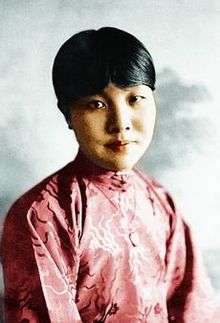Bing Xin
Xie Wanying (Chinese: 謝婉瑩; October 5, 1900 – February 28, 1999),[1] better known by her pen name Bing Xin (Chinese: 冰心) or Xie Bingxin, was one of the most prolific Chinese writers of the 20th century. Many of her works were written for young readers. She was the chairperson of the China Federation of Literary and Art Circles. Her pen name Bing Xin (literally "Ice Heart") carries the meaning of a morally pure heart, and is taken from a line in a Tang Dynasty poem by Wang Changling.
Bing Xin (Xie Wanying) | |
|---|---|
 Bing Xin in the 1920s. | |
| Born | 5 October 1900 |
| Died | 28 February 1999 (aged 98) |
| Alma mater | Yenching University |
| Spouse(s) | Wu Wenzao |
| Children | Wu Qing |
| Parent(s) | Xie Baozhang (謝葆璋) Yang Fuci (楊福慈) |
| Awards | 1998 Lu Xun Literary Prize |
| Bing Xin | |||||||
|---|---|---|---|---|---|---|---|
| Chinese | 冰心 | ||||||
| Literal meaning | Ice Heart | ||||||
| |||||||
| Xie Wanying | |||||||
|---|---|---|---|---|---|---|---|
| Traditional Chinese | 謝婉瑩 | ||||||
| Simplified Chinese | 谢婉莹 | ||||||
| |||||||
Life
Bing Xin was born in Fuzhou, Fujian, but moved to Shanghai with her family when she was seven months old, and later moved yet again to the coastal port city of Yantai, Shandong, when she was four. Such a move had a crucial influence on Bing Xin's personality and philosophy of love and beauty, as the vastness and beauty of the sea greatly expanded and refined young Bing Xin's mind and heart. It was also in Yantai Bing Xin first began to read the classics of Chinese literature, such as Romance of the Three Kingdoms and Water Margin, when she was just seven.
In 1913, Bing Xin moved to Beijing. The May Fourth Movement in 1919 inspired and elevated Bing Xin's patriotism to new high levels, starting her writing career as she wrote for a school newspaper at Yanjing University where she was enrolled as a student and published her first novel. While at Yanjing in 1921, Bing Xin was baptized a Christian, but was throughout her life generally indifferent to Christian rituals.[2]
Bing Xin graduated from Yanjing University in 1923 with a bachelor's degree, and went to the United States to study at Wellesley College, earning a master's degree at Wellesley in literature in 1926. She then returned to Yanjing University to teach until 1936.
In 1929, she married Wu Wenzao, an anthropologist and her good friend when they were studying in the United States. Together, Bing Xin and her husband visited different intellectual circles around the world, communicating with other intellectuals such as Virginia Woolf.
In 1940, Bing Xin was elected a member of the National Senate.[3]
Later in her life, Bing Xin taught in Japan for a short period and stimulated more cultural communications between China and the other parts of the world as a traveling Chinese writer. In literature, Bing Xin founded the "Bing Xin Style" as a new literary style. She contributed a lot to children's literature in China (her writings were even incorporated into children's textbooks), and also undertook various translation tasks, including the translation of the works of Indian literary figure Rabindranath Tagore.
Bing Xin's literary career was prolific and productive. She wrote a wide range of works—prose, poetry, novels, reflections, etc. Her career spanned more than seven decades in length, from 1919 to the 1990s.
Legacy
Selected works
- Jimo (寂寞, Loneliness) (1922)
- Chaoren (超人, Superhuman) (1923)
- Fanxing (繁星, A Myriad of Stars) (1923)
- Chunshui (春水, Spring Water) (1923)
- Liu yi jie (六一姐, Six-one sister) (1924)
- Ji xiao duzhe (寄小讀者, To Young Readers) (1926)
- Nangui (南歸, Homeward South) (1931)
- Bing Xin Quanji (冰心全集, The Collected Works of Bing Xin) (1932–1933)
- Yinghua zan (櫻花讚, Ode to Sakura)
- Wo men zheli meiyou dongtian (我們這裡沒有冬天, No Winter in My Hometown) (1974)
- Wo de guxiang (我的故鄉, My Home) (1983)
- Guanyu nuren (關於女人, About Females) (1999)
Works available in English
- The Photograph. Beijing: Chinese Literature Press (1992)
- Spring Waters. Peking, (1929)
- The Little Orange Lamp (小橘灯, 1957), translated by Gong Shifen, Renditions, Autumn 1989, pp. 130–132.[8][9][10]
References
- "Bingxin | Chinese author". Encyclopedia Britannica. Retrieved 2017-10-19.
- Li Daonan (May 17, 2019). "Bing Xin's Christian Faith and Real Life". China Christian Daily.
- James Z. Gao: Historical Dictionary of Modern China (1800-1949)
- Bing Xin Museum Receives Author's Household Estate, CCTV, 2004-03-24, archived from the original on 2011-07-07, retrieved 2010-04-28
- "冰心儿童文学新作奖" [Bing Xin Children's Literature Award]. Baidu Baike.
- Abrahamsen, Eric. "The Bing Xin Children's Literature Award". Paper Republic. Archived from the original on 2016-08-27. Retrieved 2016-07-06.
- "List of Bing Xin Award Winning New Works of Children's Literature 2005-2011 2005年-2011年冰心儿童文学新作奖获奖篇目". Chinese-forums.com.
- Bing Xin. "The Little Orange Lamp" (PDF). Translated by Gong Shifen.
- "chinese-shortstories.com". www.chinese-shortstories.com.
- "Bing Xin and The Little Orange Lantern". 29 December 2016.
Further reading
- Chen, Mao. "In and Out of Home: Bing Xin Recontextualized" (Chapter 5). In: Williams, Philip F. (editor). Asian Literary Voices: From Marginal to Mainstream (Archive). Amsterdam University Press, 2010. ISBN 978-90-8964-092-5. p. 63-70. Available at the OAPEN Library.
Portrait
- Bing Xin. A Portrait by Kong Kai Ming at Hong Kong Baptist University Library
External links
| Wikiquote has quotations related to: Bing Xin |